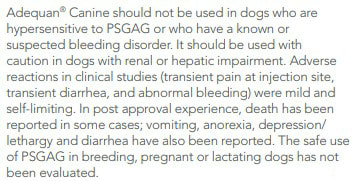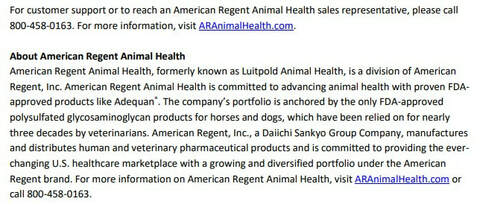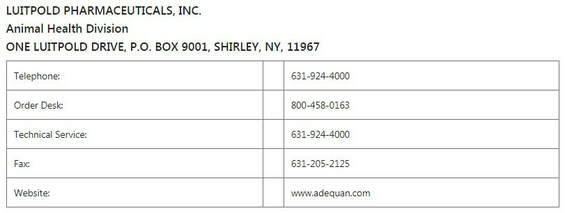Ask your Vet for Equine Adequan especially on loading doses especially for larger dogs. It's cheaper!
Only difference is the Canine Adequan contains a preservative for longer shelf life.
Adequan For Dogs
Pronunciation
ADD-a-kwin
Common Drug Name
Injectable polysulfated glycosaminoglycan (PSGAG)
ADD-a-kwin
Common Drug Name
Injectable polysulfated glycosaminoglycan (PSGAG)
|
By Christie Keith
Is your dog slowing down as he gets older? Does she hesitate before jumping in the car, on the bed, or going up the stairs? Is he dragging himself up from a reclining position with his shoulders instead of springing up with his hindquarters? If so, your vet might have diagnosed your dog with osteoarthritis, the same condition that afflicts millions of American humans, too. And your vet probably suggested the same remedy that you see pushed on dozens of TV ads nightly: Non-steroidal anti-inflammatory drugs, from over-the-counter medications like Advil to prescription drugs like Vioxx or Celebrex. The canine version of these prescription drugs are known as Rimadyl, Etogesic, Metacam, and Deramaxx. Like all NSAIDs, including the human ones, they have a long list of potential side effects, include vomiting, bloody diarrhea, kidney and liver damage, and even death. Of course, side effects don't affect every animal who takes the drugs, and many pet owners are so thrilled to see their stiff, painful dog become active and limber again that they're willing to take the risk. I gave my old dog Lillie Rimadyl towards the end of her life, and I'm not saying that decision is always wrong. But there is an option that many vets and dog owners seem unaware of, and I think it's a crying shame. I'm talking about the veterinary drug called Adequan Canine. Adequan is an injectable substance known as a "polysulfated glycosaminoglycan," and is very similar to the more familiar oral supplement known as glucosamine. Adequan has been proven to be preferentially taken up by inflamed joints when injected into the dog's muscles. It soothes and lubricates the joint, naturally reducing inflammation and pain by reducing friction. Even better, instead of just masking pain as NSAIDs do, it actually helps to rebuild cartilage in the damaged joint. It's not just pain control, it's therapy. To make the "miracle" tag even more appropriate, Adequan does this without much in the way of potential side effects. Some humans who have used Adequan on themselves (there is no human version licensed in the United States) report that it stings a little; it upsets some dogs' stomachs for a while after the injection, and in very rare cases it can cause low platelets – a condition that is reversed upon stopping the drug. |
|
Adequan has one major drawback: The price up front. My hope is that if more vets started using and recommending it, the cost could come down. My vet lets me order it wholesale through her practice, and then just charges me a few dollars for the injections. Some vets will order it for you and let you give the injections yourself at home, but it's an intramuscular injection and I'm not comfortable doing those.
It's crucial that the full loading dose, following the directions in the package insert, be given. Until we followed the directions, my chow mix didn't get any relief at all from the Adequan, but as soon as we did, the change was dramatic after 2-3 injections. The biggest problem I have found with people who say they tried Adequan and it "didn't work" is that they didn't do the loading dose, so I am going to say it again: The loading dose is critical. The interval needed to maintain the dog will vary from individual to individual. Generally we would experiment with intervals as we tapered them off. Once the full loading period was done, we'd let the dog go until we saw some symptoms appear, and then we gave the injection and set the interval as one week LESS than the interval that resulted in symptoms. As my chow mix got older this interval did get shorter, but with the deerhounds, who we started the instant we saw signs that arthritis was starting, the opposite has occurred: The interval has gotten LONGER (which we found out by missing a few appointments by accident!). |
|
I sincerely wish that more vets would recommend Adequan. It is much safer than the NSAIDS such as Rimadyl and Deramaxx. It is a better first step for dealing with pain from degenerative joint disease than NSAIDS, and the NSAIDs are always there if Adequan isn't enough.
When coupled with acupuncture and chiropractic, I've observed that the benefit of Adequan is greatly increased, so if those therapies are available, they are also well worth seeking out. You can also continue the oral glucosamine supplementation with a high-quality supplement. I know owners of large dogs who say they have been able to extend the symptom-free period between Adequan injections to as much as six months by starting out aggressively, and tapering off while giving oral glucosamine supplements at the highest recommended dose. If your dog has arthritis, before you put him or her on Rimadyl, Deramaxx, or other NSAIDs, talk to your veterinarian about giving Adequan a try. There is information for dog owners as well as veterinarians on the manufacturer's website at www.adequan.com. The company that originally created Adequan has additional information at http://www.aranimalhealth.com/ |
|
Adequan Canine Sterile Injection (polysulfated glycosaminoglycan) is administered by intramuscular injection for the control of signs associated with non-infectious degenerative and/or traumatic arthritis of canine synovial joints. Adequan Canine contains polysulfated glycosaminoglycan (PSGAG). Polysulfated glycosaminoglycan is characterized as a "disease modifying osteoarthritis drug." Adequan Canine contains 100 mg/ml of polysulfated glycosaminoglycan . The recommended dose of Adequan Canine is 2 mg/lb body weight (.02 mL/lb), by intramuscular injection only, twice weekly for up to 4 weeks. Polysulfated glycosaminoglycan.
SYRINGE info *New York Residents: If you wish to purchase syringes and/or needles your order must be accompanied with a State "Certificate of Need" or a prescription from your veterinarian. In New York state, obtain a certificate by writing: New York State Department of Health Bureau Controlled Substances 433 River Street, 5th Floor Troy, NY 12180 Residents of CT, DE, IL, NJ, or NY, please ask your veterinarian for a prescription to purchase needles and syringes. An easy way to get a prescription filled is to ask your veterinarian to call us (Valley Vet) at 1-800-898-8026 or Fax to 1-800-531-2390 with the prescription information. |
|
How is it stored? Store at room temperature (68 - 77°F). What should I do if I know of or suspect there has been an overdose? Toxicity is extremely rare. If you know or suspect your pet has had an overdose, or if you observe any unusual signs, symptoms, or behaviors, contact your veterinarian immediately. What dogs/cats should not use this medication?
|
Toxicity: In a subacute toxicity study, 32 adult beagle dogs (4 males and 4 females per treatment group) received either 0.9% saline solution or PSGAG at a dose of 5 mg, 15 mg, or 50 mg per kg of body weight (approximately 2.3, 6.8, or 22.7 mg/lb), via intramuscular injection twice weekly for 13 weeks. PSGAG doses represent approximately 1X, 3X, and 10X the recommended dosage of 2 mg/lb, and more than 3 times the recommended 4-week duration of treatment. Necropsies were performed 24 hours after the final treatment. During week 12, one dog in the 50 mg/kg dosage group developed a large hematoma at the injection site which necessitated euthanasia. No other mortalities occurred during the treatment period. Statistically significant changes in the 50 mg/kg group included increased prothrombin time, reduced platelet count, an increase in ALT and cholesterol, and increased liver and kidney weights. Increased cholesterol and kidney weights were also noted in the 15 mg/kg group. Microscopic lesions were noted in the liver (Kupffer cells containing eosinophilic foamy cytoplasm), kidneys (swollen, foamy cells in the proximal convoluted tubules), and lymph nodes (macrophages with eosinophilic foamy cytoplasm) in the 15 mg/kg and 50 mg/kg groups. Intramuscular inflammation, hemorrhage, and degeneration were seen in all 3 PSGAG treated groups; the incidence and severity appeared dose related.
The following adverse events are based on voluntary, post-approval reporting. Not all adverse reactions are reported to FDA/CVM. It is not always possible to reliably estimate the adverse event frequency or establish a causal relationship to product exposure using these data. The signs reported are listed in decreasing order of reporting frequency.
Vomiting, anorexia, depression/lethargy, diarrhea.
In some cases, death has been reported.
To report suspected adverse drug events, contact Luitpold Pharmaceuticals, Inc. at 1-800- 458-0163. For additional information about adverse drug experience reporting for animal drugs, contact FDA at 1-888-FDA-VETS or http://www.fda.gov/AnimalVeterinary/SafetyHealth.
Use within 28 days of first puncture of vial and puncture a maximum of 10 times. Dispose of spent needles in accordance with all federal, state and local environmental laws.
The following adverse events are based on voluntary, post-approval reporting. Not all adverse reactions are reported to FDA/CVM. It is not always possible to reliably estimate the adverse event frequency or establish a causal relationship to product exposure using these data. The signs reported are listed in decreasing order of reporting frequency.
Vomiting, anorexia, depression/lethargy, diarrhea.
In some cases, death has been reported.
To report suspected adverse drug events, contact Luitpold Pharmaceuticals, Inc. at 1-800- 458-0163. For additional information about adverse drug experience reporting for animal drugs, contact FDA at 1-888-FDA-VETS or http://www.fda.gov/AnimalVeterinary/SafetyHealth.
Use within 28 days of first puncture of vial and puncture a maximum of 10 times. Dispose of spent needles in accordance with all federal, state and local environmental laws.
| |||












